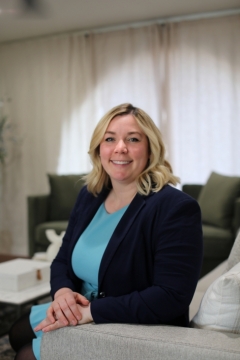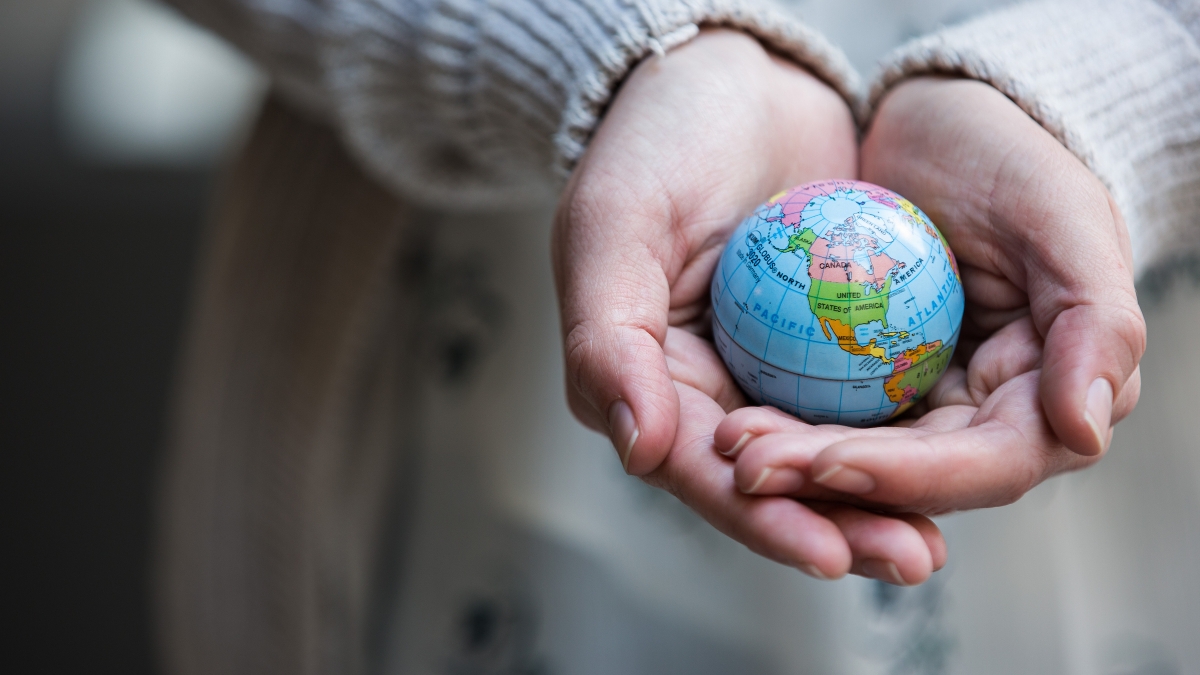From awaiting acceptance letters to becoming recognized pillars of their communities, Arizona State University College of Global Futures alumni Colin Tetreault, Jordan Hibbs, Sarra Tekola and Kaitlin Chuzi were recently selected for the college's Alumni Hall of Fame.
The Distinguished Achievement Award, which was given to Tetreault and Hibbs, recognizes an alum’s accomplishments in their profession.
Tekola and Chuzi received the Emerging Leader Award, which is given to recent graduates with significant community-centered contributions.
The award recipients were nominated by other College of Global Futures alumni, staff and faculty.
Nominated individuals sent an updated resume, and winners were determined via a rubric and group vote.
This marks the second year that the College of Global Futures has distributed these honors among its graduates.

Colin Tetreault
Tetreault is deeply familiar with ASU; he attended kindergarten at the university and earned his bachelor's and master's education from ASU. He met his future wife, Jenny Holsman Tetreault, at ASU and they married with Sparky in attendance.
Now a senior manager for Ernst & Young’s climate change and sustainability services division, Tetreault has used his master's degree from the School of Sustainability daily in his work since graduation.
“My education really focused on using the power of enterprise for good, and that’s really come full circle to my work as an executive here at Ernst & Young,” Tetreault said. “I work daily with the world’s largest companies and governments, domestically and internationally, to help provide good bottom line results to make our world more secure, prosperous and just overall.”
Tetreault’s work at Ernst & Young, an international finance firm with more than 365,000 employees globally, puts him at the center of conversations about how large entities address sustainability, environmental, health and safety, and climate change risks. He has previously chaired and also serves on the Environmental Quality and Sustainability Commission for the city of Phoenix, where he engages the public and takes steps to recommend policy to responsibly advance sustainability.
Tetreault was previously the senior policy advisor of sustainability to Mayor Greg Stanton of Phoenix, a faculty associate at the School of Sustainability, and led state, regions and public authorities in North America for CDP, a global climate not-for-profit.
In addition to his sustainability work, Tetreault also collaborates with local charities through his “Sun Devil fanbulance,” an ambulance he converted into an ASU-themed vehicle. Tetreault has used the vehicle during football tailgates in collaboration with Big Brothers Big Sisters of Central Phoenix, a youth mentoring program. The collaborations with local charities through the “fanbulance” combine both his love of volunteer work and the ASU community.
“The innovative spirit that the School of Sustainability and the College of Global Futures embodies has carried with me and is still with me,” he said. “The work I do isn’t just a job. I found a place where I can align the things I deeply care about and be entrepreneurial and innovative, and that’s something I learned at ASU.”

Jordan Hibbs
Growing up, Hibbs couldn’t visualize a pathway to a higher education. However, through pathways created by the Maricopa Community College system and then support from her undergraduate advisors at ASU, Hibbs discovered a passion for policy that led her to her current role as a foreign affairs specialist at the National Nuclear Security Administration’s Office of Defense Nuclear Nonproliferation.
She earned her bachelor’s degree in psychology with a minor in political science in 2014 and her master's degree in science and technology from the School for the Futures of Innovation in Society in 2015. She said the coursework in her master’s program prepared her to think about science and technology issues in a holistic way.
“I have always had an urge to be part of something bigger than myself,” Hibbs said. “I realized that you can shape the lives of people through policy — to try to make the world a bit better and give people a shot at a better life.”
Hibbs started her federal government service at 22 years old, when she was a presidential management fellow working in energy policy for the U.S. Department of Energy. Hibbs has also worked at the Pentagon on nuclear policy issues with the Department of the Navy and the Office of the Secretary of Defense since her beginnings in government service.
She said her academic journey was supported greatly by faculty and staff from her community college and ASU, including Clinical Associate Professor Mary Jane Parmentier. In response to the support Hibbs received, she created the Jordan A. Hibbs Scholarship Endowment to financially assist Maricopa Community College community students who are interested in furthering their education. In addition to creating the scholarship, she also encourages students to connect with their community members while still in school.
“I’d recommend finding mentors across the experience spectrum — senior mentors, peer mentors — and being a mentor yourself,” she said. “Mentors are a great way to help navigate your studies or career, big decisions and challenging situations. I am so grateful to my mentors who have helped me and who are still helping me navigate my studies, career and beyond.”

Sarra Tekola
“Bring science to the sidewalks.” This motto inspired Tekola to go beyond a laboratory setting and take a hard look at systems taking place within communities. Tekola earned their PhD in sustainability in 2022 and now serves as the co-founder, co-director and development director of Black Lives Matter Phoenix Metro. Tekola said it was ASU’s transdisciplinary approach to sustainability that attracted them to the School of Sustainability.
“I was looking to fuse decolonization, climate justice, climate change, political ecology and liberation psychology,” Tekola said. “As a non-binary person, I was very attracted to the idea of this transdisciplinary approach because I feel like the binaries keep us in boxes.”
Tekola’s work prior to ASU focused on climate justice in the face of climate change, with research in fields like oceanography and wildlife biology. However, they shifted gears to the social sciences when they realized the impact of societal barriers in mitigating the effects of climate change.
“At the time I was looking at, really, ways we could science our way out of climate change,” Tekola said. “I decided that we needed to study humans because they were the barrier to getting things done. And then it was in seeing this connection with the Industrial Revolution, facilitated by slavery and colonialism, where carbon emissions began to rise.”
Through their PhD, Tekola studied the connection between climate change and colonization. Today, they use their academic experience as well as their experience with Black Lives Matter Phoenix Metro to do independent climate justice consulting. One such project involves solidarity support in the Navajo Nation around climate change mitigation and water collection strategies.
“While I was in school, people would say that my activism was a distraction to my work and it wasn’t going to help me, but now it’s my job,” Tekola said. “I think I would push back on the idea that extracurriculars are extra. I think they’re fundamental and critical, and if you do it right, you can make a job out of it.”

Kaitlin Chuzi
As the director of biomimicry at Microsoft, Chuzi brings nature’s perspective to the innovation table to inspire groups of engineers, chemists and designers. Chuzi said getting a master’s degree in biomimicry from ASU was an opportunity to combine her love of nature and technology.
“Biomimicry was the perfect field of study for me because creating technology is natural and humans aren’t the only species on the planet to do it,” Chuzi said. “Birds build elaborate nests to protect their young using only readily available and sustainable materials, termites construct complex mounds with built-in passive cooling systems, and 50 million years ago, ants started farming mushrooms without fertilizers or pesticides. That’s what biomimicry is all about; taking inspiration from what nature has already learned and using it to solve the world’s biggest challenges.”
Chuzi cites a key saying in the biomimicry field about the need to “quiet your human cleverness.” This saying encourages people to pause what they think they know about the world and make room for nature’s wisdom. This expression, in addition with the acceptance that humanity may not hold all the answers, is a guiding principle in Chuzi’s work.
“We address complex challenges, and it is not easy to admit in front of a group of brilliant people that you don’t have all the answers,” she said. “But we ask our teammates and our partners to do that multiple times a day. It takes incredible people, every day, willing to come to the table and say, ‘I don’t know.’”
At her current position with Microsoft, Chuzi examines how to incorporate nature into the design process to achieve more sustainable products. One such project looks at how Microsoft datacenters can integrate into the ecosystems that surround them, a process which has been detailed further on the Microsoft local blog and in a presentation she recently recorded as part of Microsoft Design Week.
While at ASU, Chuzi learned from pioneers of biomimicry such as Professor of Practice Danya Baumeister. Chuzi said the connections she made with faculty and fellow students while in her master’s program provided her with a network of talented, like-minded individuals.
“My best advice for current students at ASU is to make as many connections to faculty and fellow students as possible,” she said. “There are brilliant people from all over the world focused on tackling world-changing problems. Reach out to everyone you can and join forces.”
More Environment and sustainability

Pettinger to guide Southwest Sustainability Innovation Engine's sustainable technologies to market
There’s a lot of daylight between coming up with a good idea and turning that idea into something people can use.Katie Pettinger is here to help bridge that considerable gap. As the new chief…

ASU to host new Global Coordination Hub
In a new partnership between the global research network Future Earth and Arizona State University, the Julie Ann Wrigley Global Futures Laboratory will house a new hub to coordinate…

A world full of plastic ... not fantastic
Editor’s note: This is the seventh story in a series exploring how ASU is changing the way the world solves problems.When Timothy Long’s kids were growing up, he never let them toss…
